Our Food - 1 Class 3 Worksheet SST
Q1: Multiple Choice Questions (MCQs)
(i) Out of the following, which state is not famous for growing coconuts?
(a) Assam
(b) Goa
(c) Kerala
(d) Himachal Pradesh
Ans: (d)
- Traditional areas of coconut cultivation are the states of Kerala, Karnataka, Andhra Pradesh and Tamil Nadu.
- Also Maharashtra, Odisha, West Bengal, Assam, Gujarat, Puducherry and Goa; and the island territories of Lakshadweep and Andaman and Nicobar are other areas of coconut production.
- Himachal Pradesh is famous for producing apples.
 Himachal Pradesh is a good producer of apples
Himachal Pradesh is a good producer of apples
(ii) In which season do we get watermelons?
(a) Winter
(b) Summer
(c) Summer and winter
(d) None of these
Ans: (b)
- Watermelon season runs throughout the summer -- from May to September
- But the exact range depends on where you live
- Watermelon is full of amazing health benefits, especially during the summer season and offers an array of nutrients, vitamins and minerals.
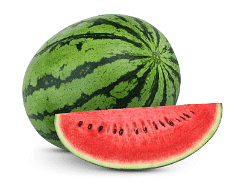 Water Melon
Water Melon
(iii) Alphonso mangoes are grown in the Ratnagri district of which state?
(a) Gujarat
(b) Goa
(c) Andhra Pradesh
(d) Maharashtra
Ans: (d)
Alphonso mangoes are traditionally cultivated in Maharashtra.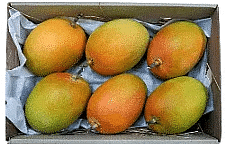
(iv) Which of the following food grains is widely consumed in various parts of India?
(a) Barley
(b) Oats
(c) Rice
(d) Quinoa
Ans: (c)
Rice is one of the widely consumed food grains in India.
(v) What are some commonly used vegetable oils for cooking in India?
(a) Olive oil, coconut oil, and canola oil
(b) Mustard oil, sunflower seed oil, and sesame oil
(c) Corn oil, palm oil, and avocado oil
(d) Peanut oil, walnut oil, and almond oil
Ans: (b)
These are commonly used vegetable oils in Indian cooking.
Q2: Fill in the blanks
(i) __________ in Maharashtra is well known for growing oranges.
(ii) Kashmir is famous for ______________.
(iii) ___________ is the staple food of North India.
(iv) In the Southern states of India,________________ is the staple food.
(v) Seasonal __________ are used in many forms to supplement the food.
Ans:
(i) Nagpur in Maharashtra is well known for growing oranges.
(ii) Kashmir is famous for Apples.
(iii) Wheat is the staple food of North India.
(iv) In the Southern states of India, Rice is the staple food.
(v) Seasonal fruits are used in many forms to supplement the food.
Explanation:
- The city of Oranges, Nagpur is famous for its oranges and listed as one of the green cities of India along with the second most populated slum in Maharashtra.
- Kashmir is the leading producer of apples in India known as the apple basket.
- The staple food of North India is wheat which is consumed in the types of rotis or chapatis with sabzi or curry.
- Rice is the staple food of the region.
- Seasonal fruits are used to supplement the diet.
Q3: Match the following
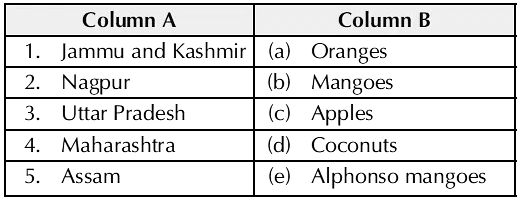 Ans:
Ans: 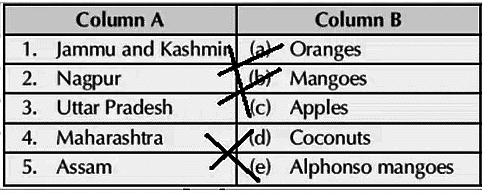
Q4: Arrange the following under proper headings
Brinjal, Banana, Mango, Apple, Tomato, Urad, Onion, Grapes, Moong, Pineapple, Turmeric, Cucumber, Orange, Coconut, Masoor, Cabbage, Radish, Lady’s finger, Carrot, Chilli, Arhar, Peas, Mango, Guava
Ans:
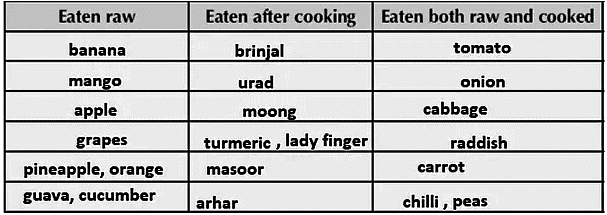
Q5: True-False Statements
(i) Vegetarians do not consume meat products.
Ans: True
(ii) Mustard oil and sunflower seed oil are commonly used vegetable oils in Indian cooking.
Ans: True
(iii) Rice is a widely consumed food grain in India.
Ans: True
(iv) Healthy food should provide carbohydrates, proteins, fats, minerals, and water.
Ans: True
(v) Spices are used to add flavor and sharpness to food.
Ans: True
Q6: Answer the following questions
(i) Name some of the spices used for cooking in India.
Ans: Typical examples of spices are cloves (buds), cinnamon (bark), turmeric (root), peppercorns (berries) etc.
(ii) Write a short note on food habits of Eastern India.
Ans: The eastern region of India consists of states like Bihar, West Bengal and Orissa. Rice is the staple food in eastern region of India.
(iii) Name four cooking oils commonly used in India.
Ans: Oils commonly used in India for cooking are:
- Mustard Oil.
- Rice Bran Oil.
- Coconut Oil.
- Olive Oil.
- Sunflower Oil.
(iv) Name four major pulses grown in India.
Ans: Red Kidney Beans (Rajma), Black Eyed Peas (Lobia), Lentils (Masoor), and White Peas (Matar) are major pulses grown and consumed in India.
FAQs on Our Food - 1 Class 3 Worksheet SST
| 1. What are some common food safety practices? |  |
| 2. How can I ensure that the food I consume is safe? |  |
| 3. What are the potential risks of consuming unsafe food? |  |
| 4. How does improper food handling contribute to foodborne illnesses? |  |
| 5. What are some tips for practicing good food hygiene at home? |  |
















